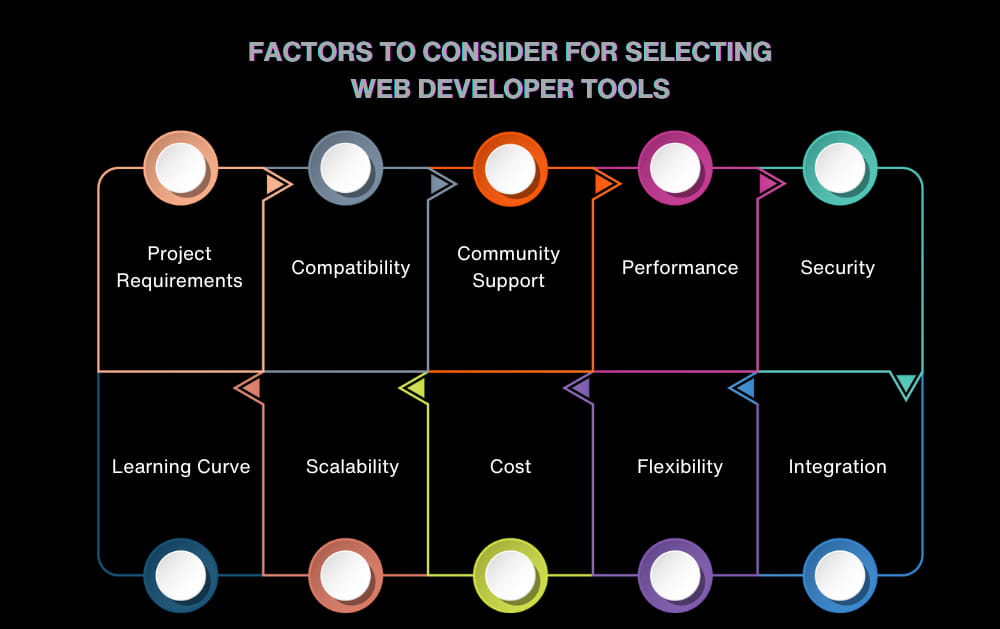Being a web developer can be a lot easier and more efficient when you have the right tools at your disposal. These essential tools can save you time, help you write better code, and improve collaboration with your team.

Let’s explore 15 must-have resources that every web developer should consider using.
1. Integrated Development Environments (IDEs)
For developers, IDEs are similar to powerful digital workplaces. They assist you in writing, editing, and organising code in a user-friendly environment. Code autocompletion, syntax highlighting, and built-in terminal support are all common features of IDEs. They are necessary for accelerating coding tasks and assuring code quality.
Examples:
- Visual Studio Code (VSCode): Highly extensible with a rich ecosystem of extensions.
- Sublime Text: It is well-known for its speed and customization capabilities.
- JetBrains’ WebStorm: Specifically designed for web development with intelligent coding assistance.
2. Version Control Systems
Version control systems allow developers to keep track of code changes, collaborate in teams, and simply rollback to earlier versions when necessary. When numerous developers are working on the same project, these tools are critical for managing code history and preventing disagreements.
Examples:
- Git: A distributed version control system known for its flexibility and powerful branching capabilities.
- Mercurial: Another distributed version control system, suitable for both small and large projects.
3. Package Managers
Package managers make it easier to install, upgrade, and manage external libraries and dependencies in web development projects. They save time and effort by handling package installations and updates automatically.
Examples:
- npm (Node Package Manager): Widely used in the JavaScript ecosystem for installing and managing packages.
- Yarn: A fast and reliable package manager developed by Facebook, compatible with npm packages.
4. Code Editors:
Code editors are lightweight tools meant to assist developers in efficiently writing and editing code. To improve the coding experience, they provide features such as syntax highlighting, code auto-completion, and indentation.
Examples:
- Sublime Text: A fast and efficient code editor with a large community and many plugins available.
- Atom: GitHub’s open-source, hackable code editor.
5. Browser Developer Tools:
Developers can inspect and debug HTML, CSS, and JavaScript elements using built-in developer tools in modern web browsers. These tools are invaluable for web page debugging and optimisation.
Examples:
- Chrome DevTools: A comprehensive set of developer tools available in the Chrome browser, including a variety of features for web development and debugging.
- Firefox Developer Tools: A set of built-in web development tools that includes a page inspector, debugger, and performance profiler.
6. CSS Preprocessors:
CSS preprocessors improve ordinary CSS capabilities by introducing variables, functions, and nesting. They provide reusable code blocks, which improve code organisation and maintainability.
Examples:
- Sass (Syntactically Awesome Style Sheets): A popular CSS preprocessor that includes sophisticated features like variables, nesting, and mixins.
- Stylus: An expressive CSS preprocessor that supports both indentation-based and CSS-style syntax.
7. Task Runners:
Task runners automate repetitive web development tasks such as minifying CSS and JavaScript, optimising pictures, and refreshing web pages while they are being developed. They save manual work and save time by streamlining the development process.
Examples:
- Grunt: A popular JavaScript task runner with a plethora of plugins.
- Parcel: A task runner with no configuration that is ideal for small projects.
8. JavaScript Frameworks:
JavaScript frameworks provide pre-built components and structures that can be used to create sophisticated and interactive online applications. They make difficult tasks easier to understand and make programmes more reusable.
Examples:
- React: A popular JavaScript library for creating user interfaces, noted for its component-based architecture and virtual DOM.
- Angular: A powerful and comprehensive framework developed by Google that is appropriate for developing sophisticated apps.
9. Code Linters and Formatters:
Code linters inspect code for flaws, enforce coding standards, and recommend code quality improvements. Code formatters format code automatically to preserve uniform and readable code styles.
Examples:
- ESLint: A popular JavaScript linter with rules that may be customised to enforce coding standards.
- Prettier: An opinionated code formatter who ensures that code style is consistent across projects.
10. Responsive Design Tools
Mockups and prototypes that adjust to different screen sizes and devices are made easier with responsive design tools. They assist developers in creating user-friendly and responsive websites.
Examples:
- Adobe XD: A design tool with prototyping features, ideal for creating responsive layouts and interactive UI designs.
- Sketch: A popular vector-based design tool for macOS, widely used for creating responsive designs.
11. Performance Testing:
Performance testing tools evaluate website speed and performance, making recommendations to improve load times and user experience. These technologies assist web developers in ensuring that their websites run optimally.
Examples:
- Lighthouse (Chrome extension): A tool for auditing web page performance, accessibility, and best practices, generating detailed reports and making recommendations for improvement.
- WebPageTest: An online performance testing application that lets you conduct tests from anywhere in the world.
12. Browser Compatibility Tools:
Browser compatibility tools assist web developers in testing their websites across a variety of browsers, operating systems, and devices. It is critical to ensure consistent functioning and appearance across varied user settings.
Examples:
- BrowserStack: It is a cloud-based application for testing cross-browser compatibility across browsers, operating systems, and devices.
- CrossBrowserTesting: A platform for testing your website on real browsers, devices, and operating systems.
13. Collaboration Platforms:
Platforms for collaboration improve team communication and coordination. Web developers may successfully share files, communicate ideas, and cooperate, expediting the development process.
Examples:
- Slack: A popular team communication software that allows for real-time conversation and file sharing.
- Microsoft Teams: A collaboration tool that connects with Microsoft Office 365 and provides chat, video conference, and file-sharing capabilities.
14. Online Code Editors and Sandboxes
Sandboxes and online code editors provide a web-based environment for developing and running programs. They are useful for quickly exchanging code snippets or experimenting with code without requiring the installation of a local development environment.
Examples:
- CodePen: It is a communal development environment and online code editor for front-end developers to share and experiment with code snippets.
- JSFiddle: A free online code editor and testing environment for HTML, CSS, and JavaScript code.
15. Code Hosting Platforms
Platforms for hosting and sharing code with the development community act as secure repositories. They offer capabilities such as version control, issue tracking, and communication to improve team productivity and code management.
Examples:
- GitHub: A popular site for hosting and maintaining Git repositories, allowing for collaboration and code review via pull requests.
- Bitbucket: A Git-based code hosting platform with sophisticated project management capabilities and integrations.
Conclusion
In conclusion, these 15 must-have web developer tools are vital for any Kolkata web design company in Kolkata. They boost productivity, promote cooperation, and provide clients with high-quality web solutions. Using these tools allows your team to flourish in web development projects, offering your firm a competitive advantage in the volatile digital market. Any developer can create new and cutting-edge web solutions that meet and exceed customer expectations by harnessing the characteristics of these technologies, building a reputation for excellence in the market.
Author Name: Khurshid Alam

Author Bio – Khurshid Alam is the founder and director of Pixel Street. A top Web Design Agency In Kolkata. He has over 8 years of experience in the industry and has worked with some of the world’s leading brands including ITC, The Hindu Group, Glocal Healthcare, etc.
